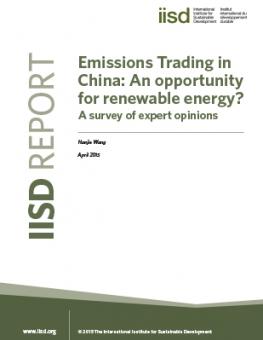
Emissions Trading in China: An opportunity for renewable energy?
Emissions trading schemes (ETSs) are being rapidly developed in China.
As of November 2014, there are seven ETS pilots in operation. Building on the experiences of the pilot systems, it is expected that a national emissions trading scheme will be established. This paper summarizes a series of interviews with experts in carbon trading and energy, to review the key issues and debates around earmarking revenues from emissions trading schemes to renewable energy.
You might also be interested in
Heatwaves to hit China once every 5 years as global extreme weather events multiply, study finds
Record-breaking heatwaves that have scorched North America, Europe and China are set to worsen in future unless the world stops burning fossil fuels, according to a study by the World Weather Attribution (WWA) academic initiative.
Transition from fossil fuels to renewable energy can pose fiscal challenges for India: study
The global transition away from fossil fuels to renewable energy sources could trigger financial challenges for India and major developing countries such as Russia, Brazil and China because of their high dependence on revenues from fossil fuel, according to a study by the International Institute for Sustainable Development (IISD).
IISD Report: Shifting Away from Fossil Fuels Could Lower BRIICS Nations' Revenues
A new report by the International Institute for Sustainable Development (IISD), titled Boom and Bust: The Fiscal Implications of Fossil Fuel Phase-Out in Six Large Emerging Economies, looks at the potential financial ramifications of phasing out fossil fuels in six emerging economies — Brazil, Russia, India, Indonesia, China, and South Africa (BRIICS). They must begin adjusting their fiscal policies to account for declining fossil fuel use or risk a $278 billion revenue gap by 2030.
India, 5 others face fall in fossil fuel revenues
As the global clean energy transition gathers pace, six emerging economies need to start adjusting their fiscal policies now to account for declining fossil fuel use-or risk a $278 billion gap in revenues by 2030, equivalent to the combined total government revenues of Indonesia and S. Africa in 2019, according to a new report by the International Institute for Sustainable Development.